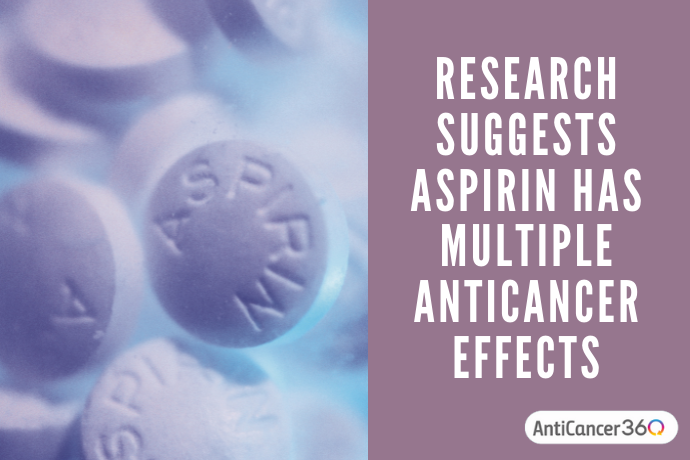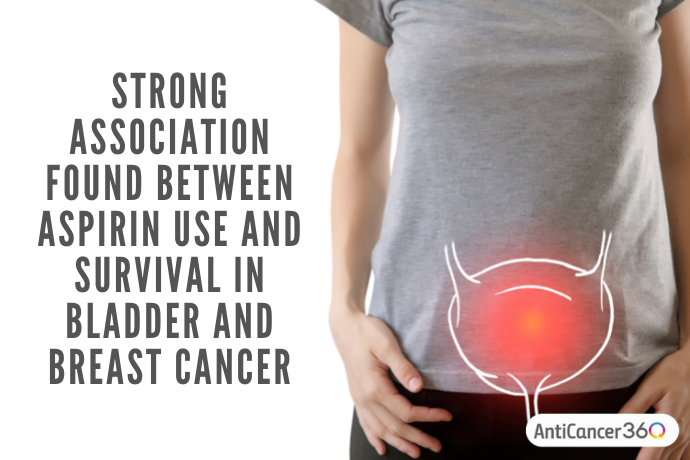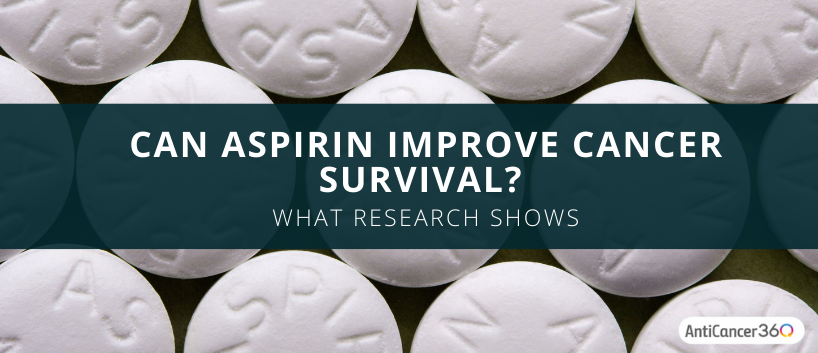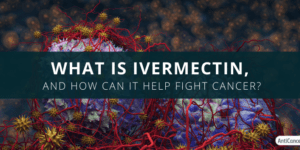Hearing of a cancer diagnosis can be difficult news to receive from your physician, sometimes overwhelming. Although this news may be tough to digest, the good news is that your situation does not have to be viewed this way. When you begin your fight against cancer there are many strategies available in addition to your oncologist’s treatments and that should help make you feel confident in your fight.
You obviously want to do everything possible to fight it, especially in advanced and challenging cases so we want to describe what current research shows about a familiar medication you may have heard of, aspirin (acetylsalicylic acid). Aspirin has many well known therapeutic applications and we will explore aspirin’s place in cancer treatment.

Similar to Metformin, aspirin has also been repurposed for its anticancer benefits. In fact, there is a known off-label use for aspirin in reducing the risk of colorectal cancer, which can be found in the guidelines from the United States Preventive Services Task Force (USPSTF) [1].
In today’s post, we’ll talk about the science behind the anticancer properties of aspirin, and how you can use it to your benefit.
What is Aspirin?
Aspirin (Acetylsalicylic Acid or ASA) is referred to as a nonsteroidal anti-inflammatory drug (NSAID) that has many FDA approved uses including the treatment of mild to moderate pain, fever, and inflammatory diseases. Aspirin is also used in the prevention of clotting in our arteries and veins.
Aspirin, being one of the oldest drugs available, can be traced back to ancient civilizations like Sumerians and Egyptians who used myrtle bark for pain relief. Hippocrates, the creator of the Hippocratic Oath, treated fever and pain with willow bark [2]. Eventually, the pharmaceutical company, Bayer AG, would discover the active ingredient from willow tree bark and introduce aspirin tablets in 1900 [3].

Even though the uses of aspirin are well known to many, you may not know that a lot of new research on aspirin explores how this old medicine can be used to prevent and treat certain cancers. In today’s article, we are going to highlight this exciting research and look at why aspirin may have anticancer benefits. Aspirin may give you an advantage in your battle against cancer, depending on your situation.
Aspirin may not be safe for everyone. It’s best to consult with your doctor or pharmacist before starting aspirin. Studies show increased risks for some groups, such as older adults and individuals taking certain medications. If you have kidney disease, liver disease, and a history of stomach bleeding, aspirin may not be suitable for you. This medicine may increase your risk for bleeding, including stomach ulcers.
Does Baby Aspirin Have Anticancer Benefits?
Baby aspirin, otherwise known as low-dose aspirin, has the “baby” title because of its low strength, 81 milligrams (mg). It’s not appropriate for babies. The original purpose of low-dose aspirin was to decrease the risk of heart attack and stroke and to prevent a second heart attack or stroke from occurring [4].
While we know that long-term aspirin use has been associated with decreased risk of heart disease, stroke, and clotting, recent clinical evidence supports aspirin’s effects on cancer [5]. The most recent epidemiological data combined with the latest clinical and laboratory studies have further substantiated aspirin as a chemopreventive agent [6].
Recent research suggests that aspirin attacks cancer by limiting cancer cell growth, preventing new blood vessel growth, blocking cancer metastasis, and triggering apoptosis (cell death). Two key enzymes called cyclooxygenase or COX-1 and COX-2 are inactivated by aspirin [7]. Tumors, especially malignant ones, have high levels of COX-1 and COX-2 [8].

In some cancers, aspirin may prevent these enzymes from creating conditions that allow the tumor to grow blood vessels and steal nutrients from healthy tissue. By inactivating COX-1 and COX-2, the tumor is less likely to proliferate as well.
Cancer cells and tumors steal nutrients from our healthy cells and tissue for their survival. Nutrients such as glucose, amino acids, and fats provide the needed energy and building blocks for cancer to grow. Our integrative cancer-fighting strategy seeks to block this transfer for energy in order to starve the cancer and aspirin is one of many tools in our toolkit.
Aspirin May Improve Survival in Breast Cancer and Bladder Cancer
The United States has a high incidence of bladder cancer and breast cancer. As with all types of cancer, there are many ways to fight it successfully. Based on aspirin’s anticancer mechanisms as described in the previous section, breast cancer and bladder cancer are recognized for having high expression of the COX-2 enzyme where aspirin can exert positive effects [9].
An important study published in the New England Journal of Medicine showed that there was a strong association between aspirin use, breast cancer survival, and bladder cancer survival. Individuals who used aspirin three times a week demonstrated the greatest risk reduction and best survival rates [10].
In breast cancer, a tumor cell pathway important for cell proliferation, migration, and adhesion is the Wnt/𝛃-catenin signaling pathway. In normal functioning cells, this pathway regulates a variety of cellular processes including proliferation and migration, but with cancer, the pathway is constantly running to allow the cancer cell to become a tumor and eventually metastasize [11].

Aspirin was shown to inhibit this pathway through in vitro (in cells) as its concentration increased. Another study completed showed that aspirin actually prevents breast cancer cell movement and metastases by putting the brakes on an overactive Wnt/𝛃-catenin pathway [12].
Another recent discovery in the fight against breast cancer is the revelation that aspirin in combination with doxorubicin can stop the growth of cancer stem cells. These stem cells are attributed to giving tumors their drug resistance and helping tumors grow quickly. In experiments with mice, researchers found that aspirin sensitized breast cancer cells to doxorubicin and effectively shrinking the tumor as cancer cells died off [13].
Aspirin Use Linked to Lower Risk of Death from Colorectal Cancer
There is an acknowledged reduction in the risk of colorectal cancer with aspirin use established in many epidemiological studies. As stated earlier, evidence suggests that nonsteroidal anti-inflammatory medicine like aspirin may restore cell death programming in colorectal polyps and inhibit angiogenesis. These specific effects are the result of inhibiting the COX-2 enzyme and other mechanisms [14].
Many colorectal cancers arise from benign polyps but there is a long period before they turn into cancer. Several trials with patients with prior colorectal cancer showed reductions in the incidence of recurrent colorectal adenomas with regular use of aspirin [15].
Multiple studies support the off-label use of aspirin for colorectal cancer prevention, and this recommendation is part of the United States Preventive Services Task Force guidelines.
Note that aspirin has an important role in colorectal cancer (CRC) prevention, but the benefit is not seen until 10 years after aspirin therapy is started. People typically need to take aspirin for at least 5 to 10 years to realize these potential benefits [16].
New evidence is showing that aspirin may reduce the risk for other digestive tract cancers. For example, people with Barrett esophagus experienced a 70% reduced risk of progression to esophageal adenocarcinoma if they took aspirin or another non-steroidal anti-inflammatory drug [17].
How To Use Aspirin: Dosages, Side Effects, and Precautions
Dosage
Aspirin is available either over the counter or by prescription in a variety of strengths and forms. It comes as a tablet, chewable tablet, enteric coated tablet, liquid filled capsules, and suppositories. There are a wide array of strengths such as 81 mg, 162 mg, 300 mg, 325 mg, 500 mg, and 650 mg.
Aspirin can be taken at the same time every day with a full glass of water. Depending on your healthcare professional’s instructions, aspirin can be taken daily or in divided doses.
Side Effects
Aspirin is generally safe and well-tolerated, but it may not be suitable for some older adults as well as people taking certain medications like blood thinners.

Rarely, side effects may include indigestion, agitation, confusion, dizziness, headache, lethargy, Reye syndrome, seizures, bleeding, or allergic reaction. Tell your healthcare professional if you develop symptoms of gastrointestinal bleeding, such as vomiting blood, dark or bloody stools, or unusual or excessive bleeding or bruising.
Make sure your doctor knows if you are pregnant, breastfeeding, or have asthma, kidney problems, or have a history of ulcers. Aspirin can cause a rare but serious illness called Reye’s syndrome in children and teenagers.
Interactions with Drugs and Supplements
Aspirin has the potential to interact with other prescription drugs and natural supplements. There may be unknown drug interactions with aspirin, especially with chemotherapy and other cancer-related medications. This is by no means an all-inclusive list of potential interactions.
- Certain prescription drugs interact with aspirin and may increase or decrease its effects. Some examples include:
-
- Dipyridamole, methotrexate, probenecid, sulfinpyrazone, ticlopidine
- Blood thinner (including clopidogrel, prasugrel, ticagrelor, warfarin)
- Blood pressure medicine
- Medicine to treat seizures (including phenytoin, valproic acid)
- NSAID pain or arthritis medicine (including celecoxib, diclofenac, ibuprofen, naproxen)
- Steroid medicine (including dexamethasone, hydrocortisone, methylprednisolone, prednisolone, prednisone)
- Supplements that may affect coagulation or have aspirin-like effects, such as
- Danshen
- Willow Bark
- Piracetam
- Feverfew
You must consult with your doctor or pharmacist before including any medications or supplements in your program. Please share your updated medication and supplement list with your healthcare provider whenever they consider a new addition to your treatment plan.
Aspirin May Be A Powerful Weapon Against Cancer
Be sure to discuss the risk-versus-benefit potential with your healthcare provider before starting aspirin, available over the counter or by prescription. They may prescribe aspirin to you if they agree that this medication is safe and appropriate for you.
Overall, you can see that there can be many potential benefits to adding a repurposed drug like aspirin to your anticancer program. You want every possible weapon in your arsenal when you are fighting cancer.
Aspirin and several other medications and natural supplements may help enhance the results of oncology treatments, improving your chances of success. Why not fight cancer from every possible angle depending on your unique situation, especially with complicated or advanced cancers?
Ultimately, when using an “Aggressive Integrative Approach” to cancer, the goal is to fight cancer from every possible direction. This approach includes examining available medications and integrating the use of natural supplements to fight cancer based on available evidence, despite limited human data, and doing it in a way that won’t interfere with your oncology treatments.
How are you approaching your cancer treatments? Are you taking any natural or dietary supplements? Have you tried aspirin? Have you made any other lifestyle changes that have made a noticeable difference in your fight against cancer? Please let us know in the comments below! If you’d like to learn more about the AntiCancer360 approach and see if we can help you. Please watch our free online webinar to learn more about us. Then at the end, you’ll be able to schedule a free call with someone from our team so that we can discuss your case in more detail.
Dr. Andrew Cox is a graduate of the University of Pittsburgh and is part of the AntiCancer360 team as a consultant pharmacist and medical writer. He received his Bachelor’s degree in Biology from Marist College and a Master of Arts in Cell Biology from Villanova University prior to completing his Doctor of Pharmacy at Pitt. He also completed his Masters of Business Administration from the University of Maine. His expertise helps us create safe herbal and supplement combinations and avoid potential drug interactions.
Andrew has been a licensed pharmacist since 2013 with experience in outpatient retail pharmacy, long term acute care, and managed care pharmacy. He is interested in the appropriate utilization of natural substances to effectively prevent and treat cancer in addition to the traditional treatment strategies. He is also interested in the research and the latest findings of the mechanisms by which various natural compounds affect the tumor microenvironment
In his free time, Andrew enjoys traveling, reading, and the Premier League games on the weekends. He resides in Pittsburgh, Pennsylvania with his wife, daughter, and a boxer mix named, Party Martie.







